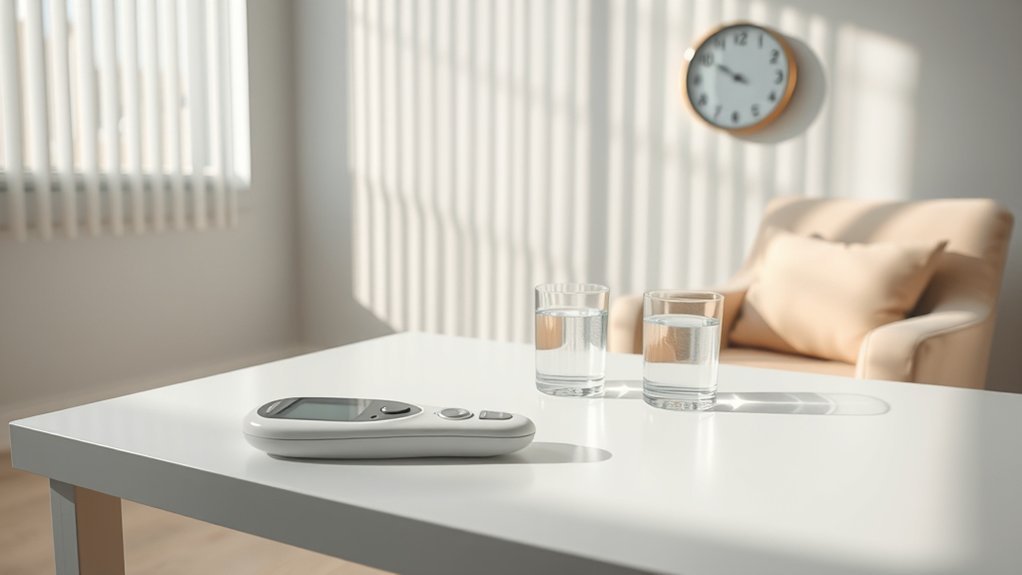When preparing for your Glucose Tolerance Test, it’s essential to know what to do and what to avoid. Your actions in the days leading up to the test can greatly impact the results. From fasting properly to managing your diet, every choice matters. If you’re unsure about the right steps to take or what mistakes to sidestep, you’ll want to keep these guidelines in mind for a successful testing experience.
Understanding the Glucose Tolerance Test
When you undergo a Glucose Tolerance Test (GTT), you’re taking an important step to assess how your body processes sugar. This test helps your healthcare provider determine if you have insulin resistance or diabetes.
During the GTT, you’ll consume a sugary drink, which contains a specific amount of glucose. Your blood sugar levels will be measured at intervals afterward to see how effectively your body manages this sugar spike. Typically, the test lasts two to three hours.
It’s vital to follow your doctor’s guidelines for accurate results. The GTT can provide valuable insights into your metabolic health, helping you make informed decisions about your diet and lifestyle. Understanding this process is essential for managing your health effectively.
Preparing for the Test: Essential Do’s
Preparing for the Glucose Tolerance Test requires careful attention to certain guidelines to guarantee accurate results. Here are some essential do’s to help you prepare effectively:
| Do’s | Description |
|---|---|
| Fast Before the Test | Avoid eating or drinking for at least 8-12 hours prior. |
| Stay Hydrated | Drink water to keep hydrated, but avoid sugary drinks. |
| Inform Your Doctor | Share any medications or health conditions that may affect the test. |
Common Mistakes: What Not to Do
It’s important to steer clear of common pitfalls that can compromise the accuracy of your Glucose Tolerance Test results.
First, don’t skip meals before your test; fasting is vital for accurate readings. Also, avoid consuming alcohol or high-sugar foods in the days leading up to the test, as they can skew your results.
Don’t change your medication regimen without consulting your doctor; sudden changes can affect your glucose levels. If you’re feeling unwell, it’s best to reschedule your test, as illness can influence your body’s response.
Finally, don’t neglect to inform your healthcare provider about any recent lifestyle changes, as these factors can also impact the test outcomes.
Being mindful of these mistakes can promote more reliable results.
During the Test: Key Considerations
After avoiding common mistakes before your Glucose Tolerance Test, focus on key considerations during the test itself.
Stay calm and relaxed; anxiety can affect your results. Follow the technician’s instructions closely, whether it’s about timing or how to drink the glucose solution. Make certain to consume the entire drink within the specified time frame, typically within five minutes.
Avoid any physical activity during the testing period, as exercise can influence your blood sugar levels. It’s vital to inform the staff about any medications you’re taking, as they might impact the results.
Finally, don’t eat or drink anything other than water until the test is complete to guarantee accurate readings. Your cooperation can lead to more reliable outcomes.
After the Test: Follow-Up and Next Steps
Once the Glucose Tolerance Test is complete, you’ll want to understand the next steps for interpreting your results. Your healthcare provider will discuss the findings with you, so it’s essential to be prepared.
Here are some important points to reflect on:
Reflect on key points to prepare for discussing your glucose tolerance test results with your healthcare provider.
- Understand Your Results: Know what your blood sugar levels indicate about your health.
- Follow-Up Appointments: Schedule any necessary follow-up visits to discuss further testing or treatment options.
- Lifestyle Changes: Think about dietary or exercise changes if your results suggest impaired glucose tolerance.
- Ask Questions: Don’t hesitate to clarify anything you don’t understand about your results or next steps.
Staying informed will help you take control of your health and make necessary adjustments for your well-being.
Frequently Asked Questions
Can I Take My Medications Before the Glucose Tolerance Test?
You should consult your healthcare provider about taking medications before the glucose tolerance test. Some medications might affect results, so it’s best to clarify with them to guarantee accurate testing and reliable outcomes.
How Long Does the Glucose Tolerance Test Typically Take?
The glucose tolerance test typically takes about two to three hours. You’ll spend the first hour fasting, then drink a glucose solution, and have your blood drawn at intervals to measure your body’s response.
What Happens if I Feel Unwell During the Test?
If you feel unwell during the test, inform the healthcare professional immediately. They’ll assess your condition and decide whether to continue or stop the test, prioritizing your well-being throughout the process.
Is the Glucose Tolerance Test Safe for Everyone?
The glucose tolerance test is generally safe, like a gentle breeze. However, it’s not suitable for everyone. If you’ve certain health conditions, consult your doctor beforehand to ascertain it’s the right fit for you.
Can I Eat or Drink Anything During the Test?
You can’t eat or drink anything during the test except for the specific glucose solution your healthcare provider gives you. It’s essential to follow their instructions precisely for accurate results.
Conclusion
In the journey of understanding your health, the Glucose Tolerance Test serves as a compass, guiding you toward clearer insights. By following the outlined do’s and avoiding common pitfalls, you guarantee a more accurate reflection of your body’s glucose response. Remember, each step is like a note in a symphony—when played correctly, it harmonizes for the best outcome. Stay vigilant, embrace the process, and let the results illuminate your path to better health.
